Related Research Articles

Highway 61 Revisited is the sixth studio album by the American singer-songwriter Bob Dylan, released on August 30, 1965, by Columbia Records. Dylan continued the musical approach of his previous album Bringing It All Back Home (1965), using rock musicians as his backing band on every track of the album in a further departure from his primarily acoustic folk sound, except for the closing track, the 11-minute ballad "Desolation Row". Critics have focused on the innovative way Dylan combined driving, blues-based music with the subtlety of poetry to create songs that captured the political and cultural climate of contemporary America. Author Michael Gray argued that, in an important sense, the 1960s "started" with this album.
"Desolation Row" is a 1965 song by the American singer-songwriter Bob Dylan. It was recorded on August 4, 1965, and released as the closing track of Dylan's sixth studio album, Highway 61 Revisited. The song has been noted for its length (11:21) and surreal lyrics in which Dylan weaves characters into a series of vignettes that suggest entropy and urban chaos.

Blonde on Blonde is the seventh studio album by the American singer-songwriter Bob Dylan, released as a double album on June 20, 1966, by Columbia Records. Recording sessions began in New York in October 1965 with numerous backing musicians, including members of Dylan's live backing band, the Hawks. Though sessions continued until January 1966, they yielded only one track that made it onto the final album—"One of Us Must Know ". At producer Bob Johnston's suggestion, Dylan, keyboardist Al Kooper, and guitarist Robbie Robertson moved to the CBS studios in Nashville, Tennessee. These sessions, augmented by some of Nashville's top session musicians, were more fruitful, and in February and March all the remaining songs for the album were recorded.
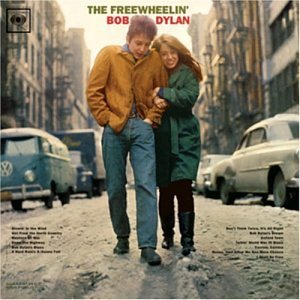
The Freewheelin' Bob Dylan is the second studio album by the American singer-songwriter Bob Dylan, released on May 27, 1963, by Columbia Records. Whereas his self-titled debut album Bob Dylan had contained only two original songs, this album represented the beginning of Dylan's writing contemporary lyrics to traditional melodies. Eleven of the thirteen songs on the album are Dylan's original compositions. It opens with "Blowin' in the Wind", which became an anthem of the 1960s, and an international hit for folk trio Peter, Paul and Mary soon after the release of the album. The album featured several other songs which came to be regarded as among Dylan's best compositions and classics of the 1960s folk scene: "Girl from the North Country", "Masters of War", "A Hard Rain's a-Gonna Fall" and "Don't Think Twice, It's All Right".

"All Along the Watchtower" is a song by American singer-songwriter Bob Dylan from his eighth studio album, John Wesley Harding (1967). The song was written by Dylan and produced by Bob Johnston. The song's lyrics, which in its original version contain twelve lines, feature a conversation between a joker and a thief. The song has been subject to various interpretations; some reviewers have noted that it echoes lines in the Book of Isaiah, Chapter 21, verses 5–9. Dylan has released several different live performances, and versions of the song are included on some of his subsequent greatest hits compilations.
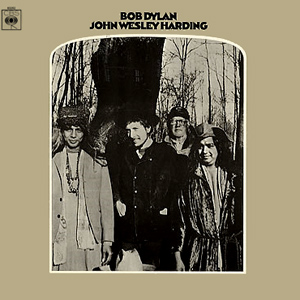
John Wesley Harding is the eighth studio album by the American singer-songwriter Bob Dylan, released on December 27, 1967, by Columbia Records. Produced by Bob Johnston, the album marked Dylan's return to semi-acoustic instrumentation and folk-influenced songwriting after three albums of lyrically abstract, blues-indebted rock music. John Wesley Harding was recorded around the same time as the home recording sessions with The Band known as The Basement Tapes.

Pat Garrett & Billy the Kid is the twelfth studio album and first soundtrack album by American singer-songwriter Bob Dylan, released on July 13, 1973, by Columbia Records for the Sam Peckinpah film of the same name. Dylan himself appeared in the film as the character "Alias". The soundtrack consists mainly of instrumental music and was inspired by the movie itself. The album includes "Knockin' on Heaven's Door", which became a trans-Atlantic Top 20 hit.
"Visions of Johanna" is a song written and performed by Bob Dylan on his 1966 album Blonde on Blonde. Several critics have acclaimed "Visions of Johanna" as one of Dylan's highest achievements in writing, praising the allusiveness and subtlety of the language. Rolling Stone included "Visions of Johanna" on their list of the 500 Greatest Songs of All Time. In 1999, Sir Andrew Motion, Poet Laureate of the United Kingdom, listed it as the greatest song lyric ever written.
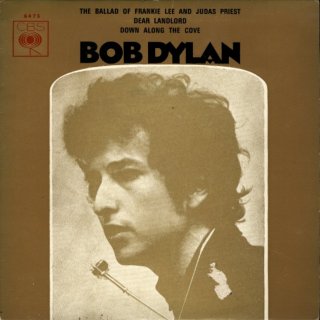
"The Ballad of Frankie Lee and Judas Priest" is a song by American singer-songwriter Bob Dylan. It was released as the fifth track on his eighth studio album John Wesley Harding (1967). The track was written by Dylan and produced by Bob Johnston. It was recorded in one take on October 17, 1967, at Columbia Studio A in Nashville. The song's lyrics refer to two friends, Frankie Lee and Judas Priest. Lee asks Priest for a loan of money and Priest offers it freely. Lee spends it in a brothel over 16 days, then dies of thirst in Priest's arms. It has been suggested by commentators that the song refers to Dylan's relationship with his manager Albert Grossman or to his contractual negotiations with his record company. The song received a mixed critical reception. Dylan performed the song live in concert 20 times, from 1987 to 2000.
Sara Dylan is an American former actress and model who was the first wife of singer-songwriter Bob Dylan. In 1959, Noznisky married magazine photographer Hans Lownds; during their marriage, she was known as Sara Lownds.
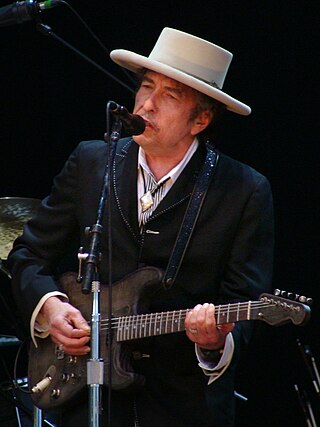
Bob Dylan is an American singer-songwriter. Often considered to be one of the greatest songwriters in history, Dylan has been a major figure in popular culture over his 60-year career. He rose to prominence in the 1960s, when songs such as "The Times They Are a-Changin'" (1964) became anthems for the civil rights and antiwar movements. Initially modeling his style on Woody Guthrie's folk songs, Robert Johnson's blues and what he called the "architectural forms" of Hank Williams's country songs, Dylan added increasingly sophisticated lyrical techniques to the folk music of the early 1960s, infusing it "with the intellectualism of classic literature and poetry". His lyrics incorporated political, social and philosophical influences, defying pop music conventions and appealing to the burgeoning counterculture.
"Bob Dylan's Dream" is a song written by Bob Dylan in 1963. It was recorded by Dylan on April 24, 1963, and was released by Columbia Records a month later on the album The Freewheelin' Bob Dylan.
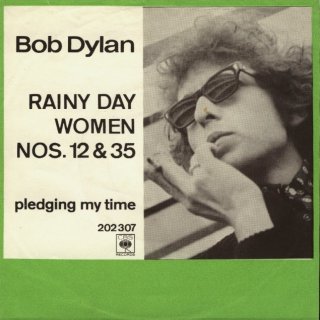
"Pledging My Time" is a blues song by American singer-songwriter Bob Dylan from his seventh studio album, Blonde on Blonde (1966). The song, written by Dylan and produced by Bob Johnston, was recorded on March 8, 1966 in Nashville, Tennessee. Dylan is featured on lead vocals, harmonica, and guitar, backed by guitarist Robbie Robertson and an ensemble of veteran Nashville session men.
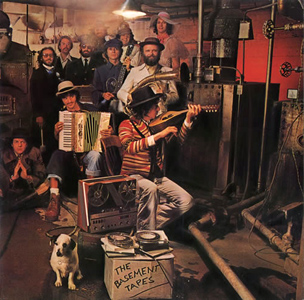
The Basement Tapes is the sixteenth album by the American singer-songwriter Bob Dylan and his second with the Band. It was released on June 26, 1975, by Columbia Records. Two-thirds of the album's 24 tracks feature Dylan on lead vocals backed by the Band, and were recorded in 1967, eight years before the album's release, in the lapse between the release of Blonde on Blonde and the subsequent recording and release of John Wesley Harding, during sessions that began at Dylan's house in Woodstock, New York, then moved to the basement of Big Pink. While most of these had appeared on bootleg albums, The Basement Tapes marked their first official release. The remaining eight songs, all previously unavailable, feature the Band without Dylan and were recorded between 1967 and 1975.

"Watching the River Flow" is a song by American singer Bob Dylan. Produced by Leon Russell, it was written and recorded during a session in March 1971 at the Blue Rock Studio in New York City. The collaboration with Russell formed in part through Dylan's desire for a new sound—after a period of immersion in country rock music—and for a change from his previous producer.

"Tonight I'll Be Staying Here with You" is a song written by Bob Dylan from his 1969 album Nashville Skyline. It was the closing song of the album. The song was the third single released from the album, after "I Threw It All Away" and "Lay Lady Lay", reaching #50 on the US Billboard Hot 100 chart, and reaching the top 20 in other countries. It was anthologized on the compilation albums Bob Dylan's Greatest Hits Vol. II and Playlist: The Very Best of Bob Dylan '60s.

"Drifter's Escape" is a song written by Bob Dylan that he recorded for his 1967 album John Wesley Harding. Columbia Records released it as a single in the US and the UK in 1969 as the B-side to "I Threw It All Away". The song was recorded in four takes on October 17, 1967. CBS Records International also issued the song paired with "John Wesley Harding" in some markets.
"Farewell", also known as "Fare Thee Well", is a song by American singer-songwriter Bob Dylan. Dylan wrote the song in January 1963. He considered it for his third album, The Times They Are a-Changin', but only attempted a few takes during the album's first studio session. Dylan's earlier recordings of "Farewell" found their way onto various bootlegs, and a collection of demos that included the song was released in October 2010 as The Bootleg Series Vol. 9 – The Witmark Demos: 1962–1964.
"I Pity the Poor Immigrant" is a song by American singer-songwriter Bob Dylan. It was recorded on November 6, 1967, at Columbia Recording Studios in Nashville, Tennessee, produced by Bob Johnston. The song was released on Dylan's eighth studio album John Wesley Harding on December 27, 1967.
"Dear Landlord" is a song by American singer-songwriter Bob Dylan. It was recorded on November 29, 1967, at Columbia Recording Studios, Nashville, produced by Bob Johnston. The song was released on Dylan's album John Wesley Harding on December 27, 1967. It is a piano blues that has been interpreted as an address to his then-manager Albert Grossman.
References
- "Black Light Diner". Allmusic. Retrieved 2011-03-11.
- Cott, Jonathan, ed. (2006). Dylan on Dylan: The Essential Interviews. Hodder & Stoughton. ISBN 0-340-92312-1.
- Crowe, Cameron (1985). Biograph (CD booklet). Bob Dylan. New York: Columbia Records.
- Heylin, Clinton (1995). Bob Dylan: The Recording Sessions, 1960–1994. St. Martin's Griffin. ISBN 0-312-15067-9.
- Heylin, Clinton (2009). Revolution In The Air: The Songs of Bob Dylan, Volume One: 1957–73 (2010 paperback ed.). Constable. ISBN 978-1-84901-296-6.
- "John Hardy Found Guilty of Murder in the First Degree". Wheeling Daily Register. West Virginia Archives and History. 1893-10-13. Retrieved 2011-03-09.
- Maginnis, Tom. "John Wesley Harding: Song Review". Allmusic. Retrieved 2011-03-09.
- "McKendree Spring". Allmusic. Retrieved 2011-03-11.
- Ruhlmann, William. "Tom Russell: Review". Allmusic. Retrieved 2011-03-11.
- Shelton, Robert (1986). No Direction Home: The Life and Music of Bob Dylan. Ballantine. ISBN 0-345-34721-8.
- Sounes, Howard (2001). Down the Highway: The Life of Bob Dylan . Grove Press. ISBN 0-8021-1686-8.